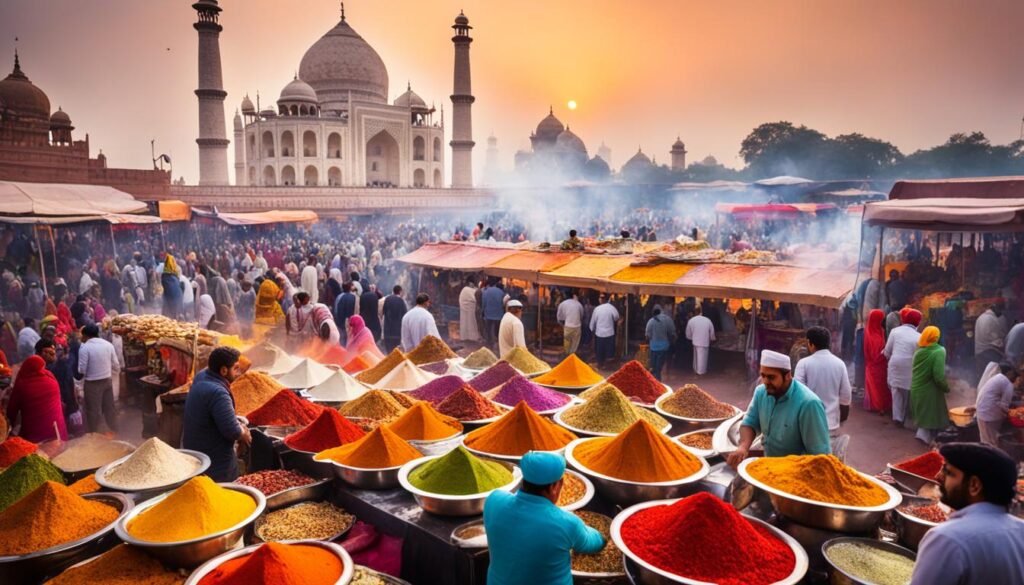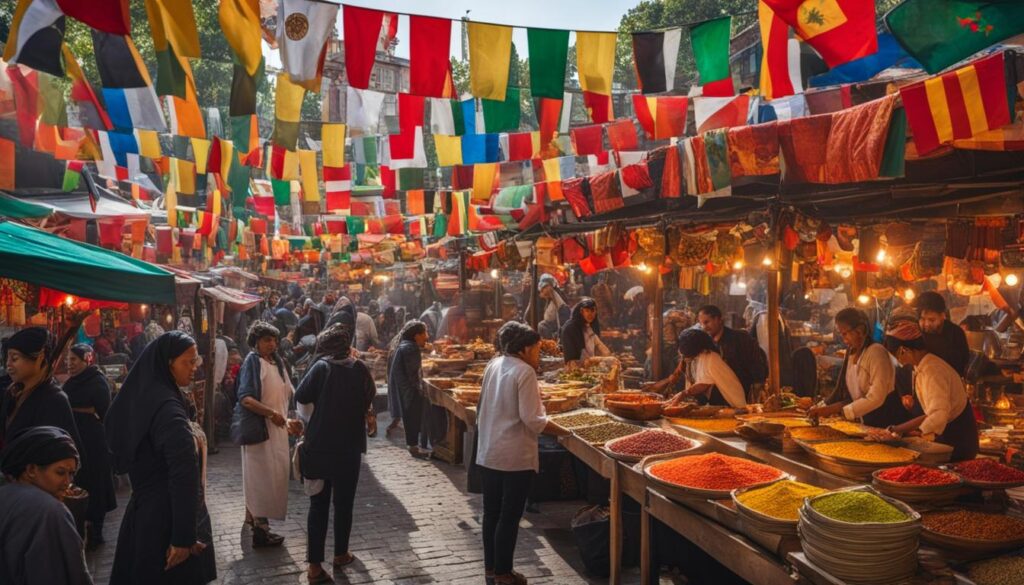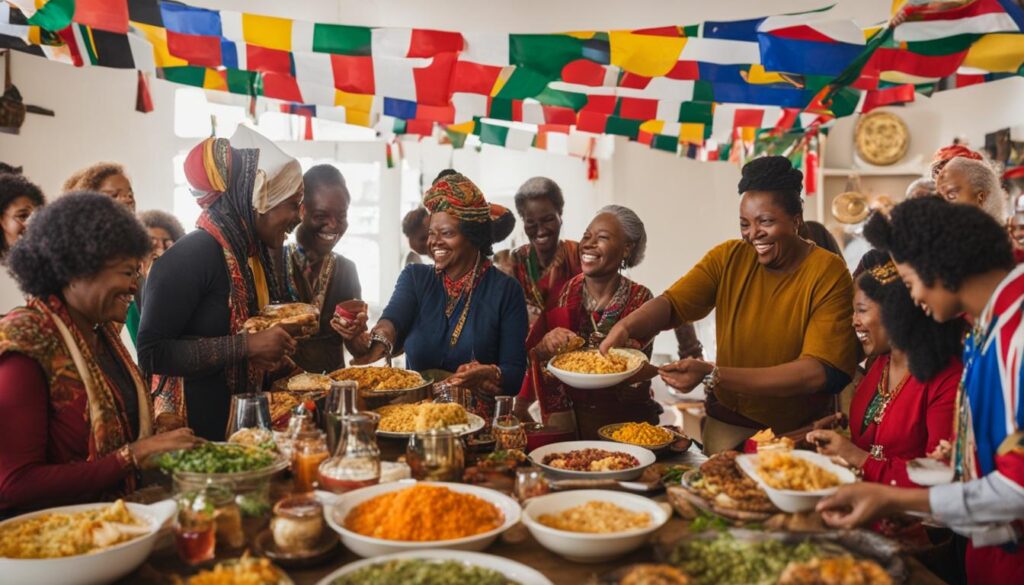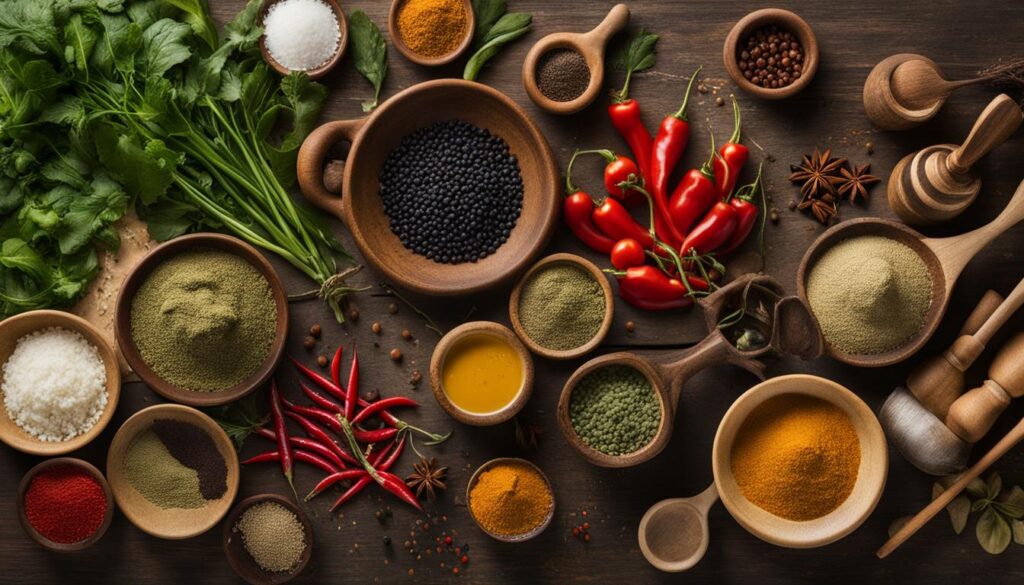Have you ever wondered about the stories behind the food on your plate? How recipes passed down through generations create a connection to our cultural roots? Or how traditional cuisine can preserve the flavors of the past and celebrate our shared history? In this article, we will take you on a journey through the world of heritage food and drink, where gastronomic heritage and cultural beverages come together in a celebration of tradition.
Key Takeaways:
- Heritage food and drink play a significant role in preserving culinary traditions.
- Traditional cuisine allows us to savor the flavors of the past and connect with our cultural roots.
- Gastronomic heritage and cultural beverages celebrate our shared history and identity.
- Exploring heritage food and drink provides a glimpse into different eras and cultures.
- By participating in global celebrations of heritage cuisine, we can appreciate the diversity of flavors and cultural experiences.
The Cultural Tapestry of Heritage Food and Drink
Heritage food and drink are not just about the flavors and ingredients; they are an integral part of a region’s cultural tapestry. Understanding intangible cultural heritage helps us appreciate the significance of traditional recipes and culinary practices.
Understanding Intangible Cultural Heritage
Intangible cultural heritage encompasses the customs, rituals, knowledge, and practices that are passed down from generation to generation within a community. It includes traditions related to food and drink, such as cooking techniques, unique ingredients, and traditional culinary skills. By preserving and honoring these intangible cultural heritage elements, we ensure that our culinary traditions continue to thrive and carry the collective memory of our ancestors.
The Rituals and Celebrations Around Traditional Cuisine
Traditional cuisine is often intertwined with rituals and celebrations that mark significant events in a community. These rituals range from elaborate feasts during religious festivals to intimate family gatherings centered around cherished recipes. Such celebrations not only bring people together but also strengthen cultural bonds and create a sense of belonging. Through the sharing of meals and the observance of traditions, communities unite and pass down their cultural heritage to future generations.
Heritage Food and Drink as a Portal to the Past
Heritage food and drink serve as a portal to the past, allowing you to experience flavors and culinary techniques that have been passed down through generations. By preserving traditional recipes and using authentic ingredients, you can taste the same flavors that our ancestors enjoyed. Exploring historical food and drink not only satisfies your taste buds but also provides a glimpse into the culinary traditions of different eras and cultures.
Immerse yourself in the rich history of traditional flavors and embark on a culinary journey that transcends time. Whether it’s indulging in ancient recipes or discovering forgotten cooking techniques, heritage food and drink allow you to connect with the past in a unique and flavorful way.
Take a moment to envision yourself preparing a traditional meal using the same methods that were employed hundreds of years ago. The aroma of spices filling the air, the sizzle of ingredients in a hot pan, and the anticipation of unraveling the deep-rooted stories behind each dish. By recreating historical recipes, you can bring the past to life on your plate.
One way to explore the portal to the past is by attending historical food and drink events or visiting heritage food museums. These immersive experiences provide an opportunity to witness traditional cooking methods, taste authentic flavors, and learn about the cultural significance of different dishes. It’s a chance to step back in time and gain a deeper appreciation for the culinary traditions that have shaped our world today.
Discovering India’s Gastronomic Heritage
India, a land known for its diverse culture and rich heritage, also boasts a gastronomic heritage that is equally varied and enticing. Indian culinary traditions span across different regions, each with its unique flavors, ingredients, and cooking techniques. From the vibrant spices of North Indian cuisine to the coastal delicacies of the South, exploring India’s gastronomic heritage is a delightful journey through a tapestry of flavors.

The Rich Diversity of Indian Culinary Traditions
Indian culinary traditions are a reflection of the country’s diverse cultural landscape. Each region has its own distinct cuisine, shaped by factors such as geographical location, climate, and historical influences. Northern India is famous for its rich curries, aromatic biryanis, and tandoori delicacies. In the Western region, the land of Gujarat offers a delectable spread of vegetarian dishes, while Rajasthan tantalizes the taste buds with its royal Rajputana cuisine.
In the South, the flavors of Kerala’s coastal cuisine and the tangy, spicy dishes of Andhra Pradesh and Tamil Nadu take center stage. Moving to the Eastern part of the country, West Bengal’s iconic fish curries and Odisha’s unique blend of flavors are a gastronomic delight. Finally, the Northeastern states showcase their indigenous ingredients and distinctive cooking styles, offering a glimpse into the lesser-known culinary traditions of India.
Regional Delicacies: From the Mountains to the Coastal Plains
India’s diverse topography also contributes to a wide range of regional delicacies. From the mouthwatering street food of Mumbai to the aromatic biryanis of Hyderabad, every corner of the country has its own local specialties. The mountainous regions of Himachal Pradesh and Uttarakhand offer hearty dishes like steaming momos and warm thukpa, perfect for the cool climate.
As we move towards the coastal plains, the cuisine takes a seafood-centric turn. The fragrant fish curries of Goa, the tangy and spicy dishes of Kerala’s Malabar coast, and the delicate flavors of Bengal’s Hilsa fish are just a few examples of the coastal delicacies that grace the Indian dining table.
Exploring India’s gastronomic heritage is not just a culinary experience but a cultural immersion. It allows us to understand the intricate connections between food, tradition, and identity. Whether you are savoring a sumptuous kebab in Lucknow or relishing a plate of idli sambar in Chennai, each bite tells a story of India’s rich culinary heritage.
Savoring the Flavors of Indigenous Heritage
The Intersection of Cultural Identity and Culinary Practices
Indigenous heritage is closely intertwined with culinary practices, as traditional recipes and cooking techniques are passed down through generations. The intersection of cultural identity and culinary practices highlights the importance of preserving indigenous food traditions. By savoring the flavors of indigenous heritage, we can gain a deeper appreciation for the diverse cultures that contribute to our global culinary landscape.

Global Celebrations of Heritage Cuisine
Heritage cuisine is celebrated worldwide through cultural festivals and events that showcase traditional dishes and culinary traditions. From the food stalls of street festivals to Michelin-starred restaurants, heritage cuisine takes center stage, allowing you to explore different flavors and cultural experiences. Global celebrations of heritage cuisine provide a platform for communities to come together, share their culinary traditions, and celebrate cultural diversity.

These cultural festivals and events bring people from all walks of life to savor the rich tapestry of traditional dishes. Whether it’s the vibrant colors and flavors found in Indian street food at the Pushkar Fair in Rajasthan or the exquisite delicacies served at the World Gourmet Summit in Singapore, these celebrations offer a feast for the senses.
“Food is the universal language that brings people together. It transcends boundaries and bridges cultures, allowing us to connect on a deeper level. Global celebrations of heritage cuisine provide a unique opportunity to experience the richness and diversity of culinary traditions from around the world.”
Attending these cultural festivals not only allows you to indulge in traditional dishes but also offers insights into the history, rituals, and stories behind them. You can witness cooking demonstrations by renowned chefs, participate in food tastings, and learn firsthand about the techniques and ingredients used in preparing these traditional delicacies.
Global celebrations of heritage cuisine also play a significant role in preserving culinary traditions. By shining a spotlight on traditional dishes, these events create awareness and appreciation for the cultural heritage associated with them. They encourage communities to pass down recipes and cooking techniques to future generations, ensuring that these traditions thrive and remain an integral part of our global culinary landscape.
So whether you find yourself browsing through food stalls at a cultural festival or indulging in a multi-course meal at a renowned restaurant, take the opportunity to savor the flavors of heritage cuisine and immerse yourself in the vibrant tapestry of cultural festivals that celebrate traditional dishes.
| Event | Location | Date |
|---|---|---|
| Pushkar Fair | Rajasthan, India | November |
| World Gourmet Summit | Singapore | April |
| La Tomatina | Buñol, Spain | August |
| Oktoberfest | Munich, Germany | September-October |
| Harbin Ice and Snow Festival | Harbin, China | January-February |
Heritage Food and Drink: Catalysts for Community and Unity
Heritage food and drink act as catalysts for community and unity, bringing people together through shared meals and cultural practices. Whether it’s a family gathering or a community feast, food has the power to foster social bonding and create a sense of belonging. Traditional recipes and culinary traditions are often passed down within families and communities, strengthening connections and preserving cultural heritage.
When we come together to share a meal, we not only nourish our bodies but also forge deeper connections with our loved ones. Through the act of cooking and enjoying traditional dishes, we create opportunities for conversation, laughter, and storytelling. Shared meals become a platform for building relationships, fostering a sense of community, and celebrating our collective history.
“Food is the ingredient that binds us together.”
Food is more than just sustenance; it is a language that transcends cultural boundaries. It allows us to connect with people from different backgrounds and immerse ourselves in their traditions. When we share a meal with someone, we open ourselves up to their experiences, their flavors, and their stories. It is through these shared culinary experiences that we find unity in diversity.
Cultural practices surrounding food also play a significant role in fostering community and unity. From traditional cooking techniques to rituals associated with mealtime, these practices serve as a reminder of our shared values and beliefs. They serve as a thread that connects us to our ancestors and helps us understand where we come from.
The act of preparing and enjoying heritage food and drink is a way to honor our roots and preserve our cultural identity. By passing down recipes and culinary traditions from one generation to another, we ensure that our heritage remains alive and thriving. Through food, we bridge the gap between the past and the present, preserving the essence of our cultural heritage for future generations to embrace and cherish.
| Benefits of Heritage Food and Drink for Community and Unity |
|---|
| Strengthens familial and communal bonds |
| Creates opportunities for cultural exchange and understanding |
| Fosters a sense of belonging and identity within a community |
| Promotes social cohesion and cooperation |
| Preserves and celebrates cultural heritage |
Through the shared experience of preparing and partaking in heritage food and drink, we create lasting memories and forge connections that transcend borders and differences. By embracing our culinary traditions and cherishing the flavors of the past, we contribute to the vibrant tapestry of community and unity that defines our shared human experience.

Protecting and Preserving Culinary Traditions
Preserving culinary traditions is essential to safeguarding food heritage for future generations. Organizations like UNESCO play a crucial role in recognizing and protecting culinary traditions as part of intangible cultural heritage.
The Role of UNESCO in Safeguarding Food Heritage
UNESCO, the United Nations Educational, Scientific and Cultural Organization, is committed to protecting and promoting cultural heritage around the world. As part of its mission, UNESCO recognizes and lists various cultural practices, including culinary traditions, as intangible cultural heritage. By safeguarding these traditions, UNESCO aims to preserve the diversity and richness of our global food heritage.
Through its programs and initiatives, UNESCO raises awareness about the importance of culinary traditions and their contribution to cultural identity. By providing support and guidance, UNESCO helps communities preserve their traditional recipes, cooking techniques, and culinary rituals.
For example, the Mediterranean diet, known for its health benefits and rich cultural significance, has been recognized by UNESCO as an intangible cultural heritage. This recognition not only celebrates the unique flavors and ingredients of the Mediterranean region but also emphasizes the social and cultural value of traditional eating practices.

Cooking and Consuming with Respect to Origins
Cooking and consuming with respect to origins is a fundamental aspect of preserving culinary traditions. By using locally sourced ingredients and traditional cooking methods, we can honor the origins of our food and maintain the authenticity of traditional recipes.
When we cook with respect to origins, we embrace the flavors, techniques, and cultural significance behind each dish. We understand the importance of using locally grown produce, supporting local farmers, and preserving the environmental sustainability of our food systems.
Cooking with respect to origins also encourages us to explore our local culinary heritage, learn traditional recipes, and pass them down to future generations. By doing so, we ensure that the cultural and historical knowledge embedded in our food traditions is not lost.
Furthermore, consuming with respect to origins involves appreciating the stories and traditions behind the food we eat. It means engaging in mindful eating, savoring each bite, and acknowledging the cultural and historical significance of the meal.
By protecting and preserving culinary traditions, supported by organizations like UNESCO, and cooking and consuming with respect to origins, we can ensure the continuity and vitality of our food heritage for generations to come.
Conclusion:
Heritage food and drink are more than just a way to satisfy our taste buds. They have a profound impact on preserving culinary traditions, connecting us to our cultural identity, and celebrating the flavors of the past. By understanding the cultural significance of traditional cuisine, we can appreciate the importance of preserving culinary traditions for future generations.
Participating in global celebrations of heritage cuisine allows us to explore different flavors and cultural experiences, showcasing the richness of our shared culinary heritage. By immersing ourselves in the diverse culinary traditions of India and other countries, we can develop a deeper appreciation for the creativity and craftsmanship behind each dish.
Furthermore, cooking with respect to origins is another way we can contribute to the preservation of culinary traditions. By using locally sourced ingredients and honoring traditional recipes, we not only support sustainable practices but also keep the heritage of our cuisines alive. Savoring the tradition of heritage food and drink enables us to embrace the diversity of cultures and honor the traditions that have shaped our culinary landscape.
So, whether you’re indulging in a plate of regional delicacies or preparing a family recipe passed down through generations, remember that preserving culinary traditions is a way of honoring our cultural roots. By cherishing and sharing the flavors of the past, we can ensure that our culinary heritage remains a vibrant part of our present and future.
